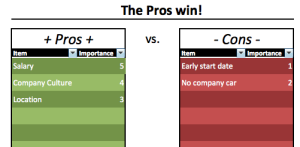
These career tips for women can change everything you know and accomplish going forward.
Because let’s face it, ladies: The climb up the career ladder may be a bit more difficult for you than for your male colleagues.
For instance, the World Economic Forum in its 2016 Global Gender Gap Report ranked the U.S. 26th (out of 144 countries) on economic participation and opportunity, an index based on measures such as wage equality, women in senior management positions, and women in professional and technical roles.
Nonprofit organization Catalyst, dedicated to progress for women in the workplace, found that while women equal men when it comes to management, professional, and related positions, they represent only four percent of CEO roles at S&P 500 companies.
When you take into account that it has really only been in the last 50 or 60 years that women have entered the workforce in significant numbers and taken on leadership positions in corporate America, it makes sense that career challenges continue to linger for women.
Add youth and inexperience into the mix, and the corporate world might seem rather daunting.
As a young woman only a couple years out of college working for a Fortune 100 company, I’ve talked to many women (and men) who ascended to senior leadership positions, and I’ve observed the behavior of peers and leaders around me.
There are a few lessons I’ve gleaned from these conversations and observations that helped me get promoted early and that I believe might help similarly ambitious young women aiming to make a great impact in their careers.
1. Be confident – and overshoot
Ask a male friend and a female friend a subjective question like, “Which city is the best city in the U.S.?” or “Who is the greatest athlete of all time?” Listen carefully to how they answer the question.
Chances are, your male friend will answer very definitively (“Michael Jordan, and here’s why…”).
On the other hand, your female friend is more likely to dance around the point or try to justify her answer (“Well, I think maybe Bo Jackson, but that’s just my opinion…”).
This self-doubt plays out across many facets of life. You might call the male attitude delusion or overconfidence, but the corporate world tends to look favorably upon it.
There’s an energy and excitement about a person who is willing to set out on the path without quite knowing how he’s going to get to his destination.
There are a couple areas of work where this attitude comes into play. One is job applications.
Men will apply for a job when they meet 60 percent of the listed qualifications. Women only apply for a job when they meet 100 percent of the qualifications. That is a stunning difference.
I wouldn’t have gotten the job I have today if I had been worried about the requirements. I think the mindset here hearkens back to school days: rubrics, structures, rules…what do you need to do to get an A?
Girls tend to do better in school than boys, which is of course a good thing – except when it results in the impression that you need to “follow the rules” to get ahead.
No one gets ahead by following the rules. Which leads me to my next point…
2. Take risks
The comfort zone is a very sinister place. It’s cozy and welcoming; it beckons you to sit down, take a load off, relax.
But staying there means certain death for your career. The only way to grow is to take risks. There are a couple of very specific ways to do this:
- Present your work – and yes, that means in front of people. Volunteer for presenting your team’s work to peers and/or leadership. Take on a project that you know will require a presentation. Getting up in front of people helps you develop confidence and poise, and allows you to deepen your communication skills.
- Take on “extracurricular” leadership roles – Your company may have associate groups or committees, community or volunteer initiatives, or other informal organizations outside of day-to-day work responsibilities. Take on leadership roles within this context. If you don’t have access to something like this at work, then take on a leadership role at a local nonprofit. Developing your leadership skills early helps you build experience, learn more about yourself, and exercise a diverse set of skills, all of which better prepare you to take on leadership roles in your job.
- Speak up – It always pays to do your homework before a meeting or presentation. Once you have, speak up when you have something to say, and remember to say it with confidence.
3. Find a mentor AND a sponsor
Many people have heard of the importance of having a mentor. A mentor can help you navigate challenges and grow professionally, and also give you access to other people who can help you in your career.
But having a mentor isn’t always enough.
Sometimes you need a sponsor: someone who will vouch for you, connect you to the hiring managers for specific jobs, and serve as a reference for you.
What a lot of women don’t realize is that getting a job is not about checking the boxes. It’s not about doing everything “right.”
Doing everything “right” is, essentially, a given: You have to be a great performer.
But companies are run by people, and people want to know and like the people they work with. That means that knowing people and cultivating a stellar reputation is vital to moving up.
However, if you’re like me, and you’re not “political,” that’s okay. This isn’t about politics.
It’s truly about people. It’s about learning from those you admire, and asking for their support and advocacy. People who have achieved success love to help others out – someone likely did the same for them.
One thing you might be wondering is: Well, that’s all well and good, but how do I GET a mentor and sponsor in the first place?
For women, it may be harder depending on the culture. This is where confidence and assertiveness come back in.
If you want someone to mentor you…ask him or her. See if they would be willing to meet once a month and go over specific development topics that you plan for ahead of time.
And once you’ve developed a relationship with a mentor, you can ask them for support. The corporate world is brimming with opportunities if you’re willing to go after them.
4. Write a development plan, and ask for feedback
It’s also really important to reflect upon your career thus far, and your vision for where you want to go.
This doesn’t have to, and in fact shouldn’t be, permanent and inflexible. Career goals can and should change. You don’t have to have it all figured out, and you should probably set aside your existential crises, because they just get in the way. You can wallow in those on your personal time.
But having some clear short-term goals help you focus: They give you purpose and direction (What skills do you need to develop and how can you develop them? Who might you want to learn from in order to achieve your goals? What training or education might you need?).
They allow you to reflect on what you’ve learned and how you learned it.
And they allow you to be your own advocate: Ask your manager for ideas and/or support on how to achieve your goals. And be sure to ask for feedback, specifically for opportunity areas. Being self-aware allows you to continually improve.
5. Take it on – all of it – with enthusiasm
Make your default “yes.” When no one else on the team wants to do something, volunteer to do it.
The more you do, the more you learn, and the more you become an invaluable and irreplaceable part of the team. Skill and smarts are a dime a dozen, but hard work and enthusiasm aren’t.
The world is filled with smart people who don’t want to “take out the trash” or put in the time. The more you can demonstrate your curiosity and willingness to learn and work hard, the more people will want to work with you and the more responsibility you will have.
And finally, as you’re taking things on, be sure to look for solutions instead of problems. It’s easy to spot problems. In fact, anybody can do it, and for many people, it becomes addicting. It’s more difficult to come up with creative solutions.
But the more you can look at the world in a positive light, with a plethora of solutions waiting just around the corner, the farther you will go.
This article was written by Libby Stagnaro, a rising star who works in Columbus, OH.


